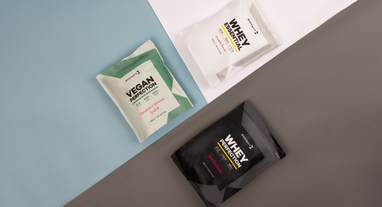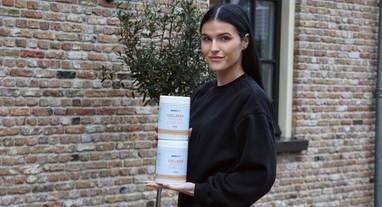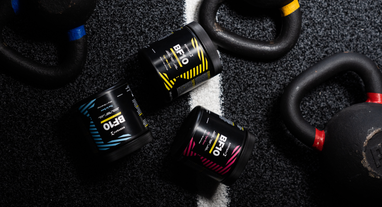EVERYTHING ABOUT WHEY PROTEIN

Whey protein is one of our most popular products and is a well-known supplement in the health and fitness industry. This is our in-depth lowdown where we tell you everything we think you need to know about it. Protein supplements, in many different forms like whey protein isolate, can play a big part in success when planning an advanced workout schedule, as an essential part of a weight loss programme, or as part of a healthier lifestyle. The benefits are wide and varied. The most important ones we go into below.
What is whey protein and how is it made?
Whey protein is a concentrated protein supplement, usually a by-product of the cheese-making process. The rise of temperature during pasteurisation splits the milk into curds and liquid whey. Essentially, whey is the watery part of the milk. The curds form the basis of cheese. In its original state, whey is a mixture made up mostly of water with some protein, fat, carbohydrates and lactose. Whey then undergoes a multi-step filtering process where the carbs, lactose and fats are filtered out. The remaining protein is then dried to form a powder. Whey naturally contains vitamins and minerals as well as all essential amino acids. This makes it a ‘complete protein’ and the ideal supplement to support muscle growth and recovery.
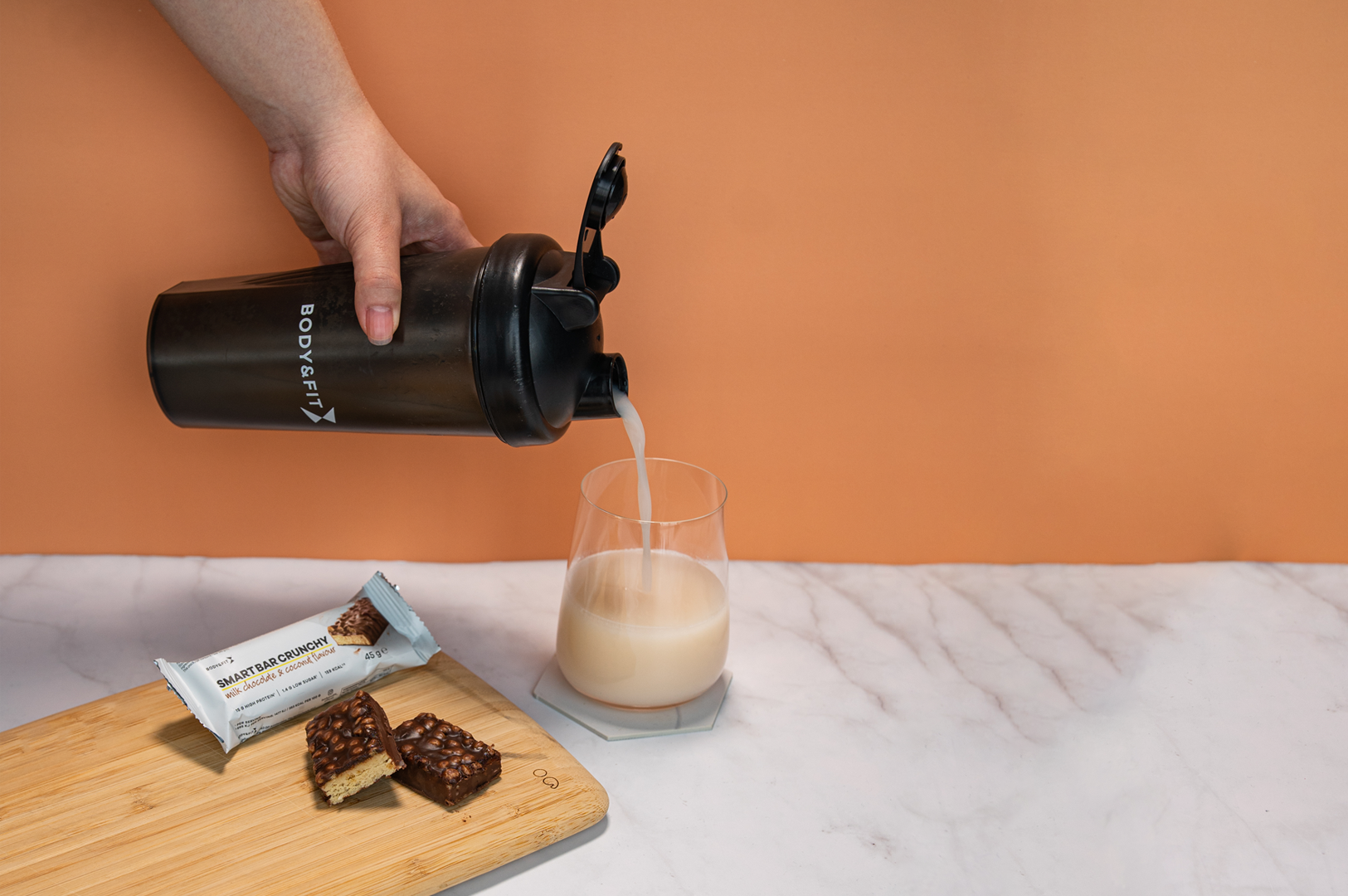
Who should take whey protein as a supplement?
Anyone from athletes to gym enthusiasts, bodybuilders, skaters, runners and spinning fanatics can benefit from whey protein. Getting enough protein used to be a case of literally loading up on chicken filets or other meats throughout the day, but now the industry has created many different ways to easily up your intake, usually through food & bars, shakes, and powders.
What are the benefits of whey protein?
Whey protein is incredibly good for you with several body-boosting powers. It has been found over many years that this protein supplement is great for training and workouts: it aids muscle growth and maintenance and is great for incorporating into a weight or fat loss programme — as long as you get the proper advice. It has become popular as a supplement because protein is one of the main things needed to build and maintain muscles.
Additionally, it’s also been shown that muscles begin to deteriorate after the age of 301. So, it can be beneficial for older people to take a protein supplement regularly, combined with working out, resistance and strength training.
What are the different types of whey protein?
There are three main types of whey protein: whey protein concentrate, whey protein isolate and hydrolysed whey protein isolate.
What is whey protein concentrate?
This form of whey protein typically contains around 70-80% protein and tends to have the best flavour due to the presence of lactose and fat. Our Whey Essential is ideal for anyone looking to introduce whey protein into their health & fitness routine. The only source of protein used to create this powder is whey protein concentrate. Overall, a versatile, effective and affordable shake offering a no-nonsense approach to sports nutrition every time you open your cupboard.
What is whey protein isolate?
One of the purest forms of whey protein, whey protein isolate goes through an extensive filtering process and usually consists of more than 90% protein. It’s absorbed faster by the body and contains less carbohydrates (including lactose) and fats. This whey supplement is often used during weight loss or cutting / dry training programmes. Our Whey Isolate XP is great for those serious about their training, packing in 25g of protein per serving.
What is hydrolysed whey protein isolate?
Hydrolysed whey protein isolate is considered ‘pre-digested’ as it’s gone through partial hydrolysis (a process that allows the body to absorb protein). So, it’s usually easier to digest than other forms of whey protein. A high-quality source of hydrolysed whey protein isolate is our Whey Perfection, which is a unique blend of hydrolysed whey, concentrate and isolate.
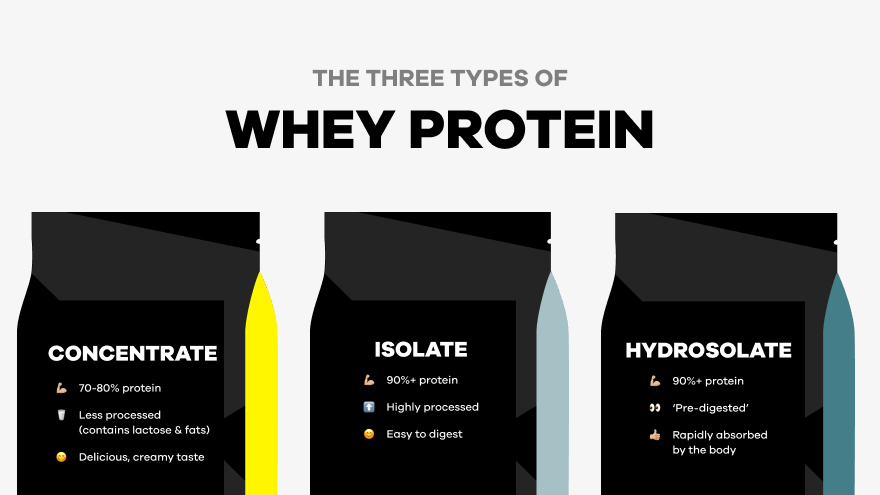
Is whey protein safe to use?
Whey protein is incredibly safe to use. After all, protein is essential in the body anyway for building and maintaining muscle, bone, strength and numerous bodily functions. However, if you are lactose intolerant or vegan – whey protein will not be suitable for you, as whey is a by-product of milk. Luckily, there are many other forms out there, not made from milk or dairy products. Also, if you’re only mildly lactose intolerant you could try a whey isolate product, as it contains less lactose, and see how you handle it.
Is it true that too much protein, like whey protein, is bad for you?
Eating high amount of any nutrient for a long period comes with risks. The same goes for protein. It’s usually recommended to take up to +/- 2g per kg of bodyweight a day when training hard — some protein comes naturally from food sources anyway.
Can I use whey protein in shakes and other food supplements?
One of the most popular ways of taking whey protein is by adding it to a pre or post workout drink or smoothie. You can also find ready-to-drink protein shakes, which are ideal if you’re on the go or struggling for time. Workouts, proteins and shakes are often mentioned in the same breath and there are many different shakes available. You can also use whey protein in baking recipes. Check out these delicious Apple Fritters, or these Mini Protein Pancakes, and discover how to step up your protein game in the kitchen via our Instagram.
Will whey protein make me fat?
Protein itself won’t make you fat. However, it does contain natural calories and weight loss is all about the caloric value of food. If the number of calories eaten is more than the amount burned during the day and night then you can gain weight, independent of the source of your calories (e.g. protein/fat/carbs).
When is the best time to take whey protein for maximum effect?
There is a lot of confusion over the best time to take whey protein in any form. Many take it pre or post workout, some take it at breakfast, and some prefer to take it before bed. It actually comes down to your fitness or weight loss goal. We go into this a bit more fully below.
Taking whey protein when working out
If working out, many people choose to take whey protein around 15-60 minutes after their workout during what’s called the ‘anabolic window’. This is when your body is working hard to regain some of the energy lost during the workout itself. Anabolism is when small molecules grow into bigger, complex molecules. These molecules form into new cells and tissues, including muscle. It’s the opposite of catabolism, or when larger molecules break down. The International Society of Sports Nutrition has recently published that the anabolic window is a lot longer than first thought, and you can take supplements like whey protein up to 2 hours after a workout2. For most people, the time taken is less important than the training that goes with it, and just taking it at some point during the day works for them.

Taking whey protein for weight loss — is this a thing?
If you’re looking to lose weight, whey protein can be great as long as it’s used alongside a healthy, balanced, calorie-restricted diet. It’s one of the most satiating macronutrients out there, so it may help supress your appetite while preserving lean muscle mass.
What happens if you use whey protein without working out?
If you take whey protein supplements and don’t work out, you won’t see the same results you would if combined with solid training regime. There can be a few things to watch out for when choosing your whey protein. Remember, not all whey protein is made equal, so choose the product that matches your unique goals.
Whey protein and sugar content
Most well-known brands won’t do this, although some may use sugar to aid the taste of their products. Also, watch out for ‘hidden sugars’ like glucose, dextrose, fructose, etc.
Whey protein and carbohydrates
Unless taking it as a breakfast alternative before working out, a whey protein supplement that is high in carbohydrates is probably not what you’re looking for. Unless, that is, you really want to pack on mass. Our leading selection of mass gainers are high in calories, protein, and perfect for bulking season.
Whey protein and allergens
Allergens should always be clearly stated on the packaging’s list of ingredients (and in the ‘nutritional information’ section for each product on our site).
If you’re still questioning whether to take it, we’d say that if you do sports, train, or workout regularly, then yes, it makes sense to consume whey protein. It will help you develop and maintain lean muscle mass. No matter what age you are, what sport you play, or what your physique aim is, whey protein powder can help you achieve your health & fitness goals.


